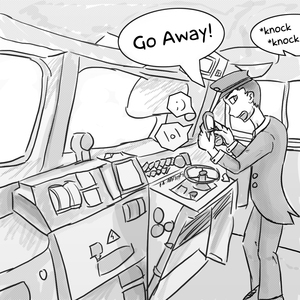Union churlishly rails on Metrolink cameras
As a general rule, when something is broken, it’s in the interest of at least one party to try to fix it.
The task of remedying the situation is made even easier if the root of the problem is easily identifiable.
These statements seem like no-brainers that merit no further argument.
Unless, of course, you’re the Brotherhood of Locomotive Engineers and Trainmen.
On Friday, Sept. 12, 2008, a Metrolink commuter train collided head-on with a Union Pacific freight train in Chatsworth, Calif., leaving 25 people dead and more than 135 injured in what turned out to be the deadliest US train crash in the last 15 years.
The resulting investigation into the cause of the crash determined that the conductor of the Metrolink train failed to stop at a red light that indicated it was unsafe to proceed.
While records show that the operator of the other train deployed emergency brakes immediately before the crash, the operator of the Metrolink train, engineer Rob Sanchez, failed to do so.
Though fatigue was thought to be a prime contributor to the crash, after further digging it investigators discovered that Sanchez had been texting on his cell phone throughout the entire train ride, including a message that was sent just 22 seconds before the time of the crash.
Though there were not regulations in place at the time of the incident, the Federal Railroad Administration passed an order restricting the use of personal electronic or electric devices by railroad operators shortly after the incident.
In direct response to the Chatsworth incident, Metrolink announced a plan to outfit all of its 52 passenger trains with cameras in the cab of each locomotive, where the engineer controls the movement of the train cars.
The idea is that the placement of cameras will help to promote safety by providing a live feed of what’s going on inside and outside of the train.
Also, by placing a camera near the control panel for the train, the hope is that train engineers and conductors will become acutely aware of the fact that they are being watched and refrain from any questionable behavior — like the type that could potentially cause another deadly train crash.
Problem solved.
Unfortunately, the union that represents Metrolink conductors, the aforementioned Brotherhood of Locomotive Engineers and Trainmen, has taken issue with this new policy and has filed a federal lawsuit to stop the implementation of camera systems aboard Metrolink’s commuter trains.
According to the lawsuit, cameras in the locomotive cab violate the right to privacy granted to the trainmen and passengers alike by the federal government. Ironically, they propose the illegal jamming of cell phones and texting signals as a better alternative to help curb any distracting activities.
Realistically, what privacy issues could arise from having a camera inside of the cab? The pressure of knowing that someone is monitoring your on-the-job actions isn’t unheard of in the world of employment. In fact, their bus driver brethren seem to be doing just fine with cameras mounted at the front of busses.
If anything, the norm is that issues of personal privacy are secondary to work safety and productivity in the professional world — just ask any number of employees who have been reprimanded or fired for the content of questionable emails.
The dramatic concern over this policy to prevent future accidents begs the question: What exactly goes on inside of these cabs that warrants such uproar about privacy rights?
The size of a typical locomotive cab is not much larger than that of an airplane cockpit, and is not wholly conducive to small-scale dance parties, cage fighting or any other potentially distracting activity.
Such constraints make it hard to believe that there is much room to do anything other than sit and monitor the progress of the train, especially given the great responsibility of ensuring the safety and well-being of the multitude of passengers being transported.
So where again does privacy fit into the equation?
It doesn’t.
One can logically assume, then, that privacy is only a means of saying that they’d rather not get caught slacking off on the job.
Maybe the greater issue is that trainmen and railroaders face long, fatiguing shifts that put them in situations where lapses in attention could occur.
But to let off steam regarding “privacy” issues seems curious and raises questions about the professionalism of the railroad workers.
If the goal of the union is to protect the reputation of locomotive engineers and trainmen by preventing exposure of shoddy on-the-job habits, it appears they’ve only succeeded in derailing the cause.
Soojin Yoon is a junior majoring in public relations. His column, “Boy Meets Word,” runs Thursday.

